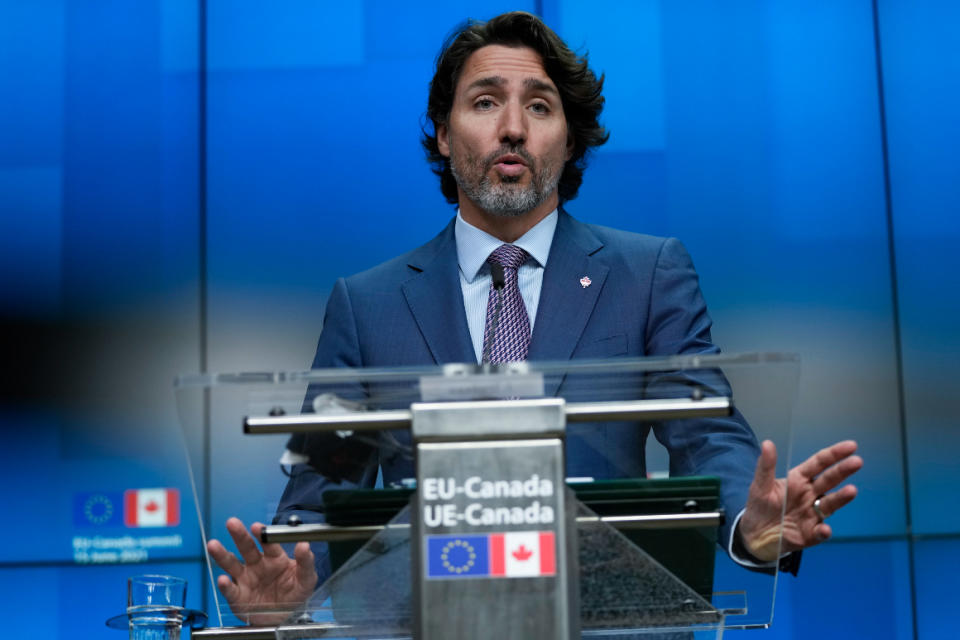Congressman fires warning shot at Trudeau over tax on U.S.-owned homes in Canada
- Oops!Something went wrong.Please try again later.
- Oops!Something went wrong.Please try again later.
OTTAWA — American frustration over Canada’s still-shuttered frontier now has an additional cross-border irritant: the prospect of a new property tax.
The Trudeau government’s April budget proposed a national tax on vacant property owned by non-residents or non-Canadians. The one percent tax is scheduled to come into force Jan. 1, 2022.
The plan has already prompted a warning shot from Rep. Brian Higgins (D-N.Y.), who is threatening to push for a retaliatory tax on Canadians with property in the U.S.
“I would rather not have to explore that in any more detail,” Higgins, whose Buffalo district is adjacent to the Canadian border, told POLITICO. “The Canadians would be wise to just re-evaluate this.”
Higgins raised the possibility of a reprisal in a recent letter to Kirsten Hillman, Canada’s ambassador to the U.S. He informed her that, if necessary, he was prepared to encourage his colleagues on the Ways and Means committee to consider reciprocal measures on Canadian owners of U.S. property.
He said in an interview he expects his fellow committee members to support such a response, if needed.
The border backdrop: Concerns about Canada’s tax proposal come as Prime Minister Justin Trudeau faces domestic and U.S. pressure to start reopening the country’s border to fully vaccinated Americans. In recent days, Canada and the U.S. announced they would keep the border closed to nonessential travel until at least July 21.

Trudeau said Tuesday that he hopes to announce loosened border restrictions “in the coming weeks.” But he stressed it’s no guarantee because it hinges on Covid-19’s evolution — including vaccination rates, case counts and the prevalence of variants.
On Wednesday, Trudeau told a radio interviewer that his government is well aware of the impatience and is moving "as quickly as possible."
“For sure, at every step people will choose to criticize because it’s their job to criticize and I accept that,” Trudeau told Tout Un Matin, a morning show on the French-language Radio-Canada.
The property tax: A couple of days after the release of the tax proposal, Deputy Prime Minister Chrystia Freeland spoke about growing housing affordability concerns and the need to discourage speculation “to ensure that houses in Canada don’t become vehicles for storing offshore wealth.”
“Houses in Canada are for Canadian families to live in,” Freeland told the Greater Vancouver Board of Trade in April. “So, that’s the thinking here.”
Freeland noted that a forthcoming public consultation on the proposal would pay particular attention to specific concerns related to vacation destinations and smaller communities.
The fallout: Higgins said lots of people from western New York own cottages in Canada, where many enjoy Ontario's beaches on Lake Erie. Many Canadians also own property on the U.S. side, he noted.
The homes, he added, are well-kept and seasonal, but not vacant.
Higgins said imposing property taxes on people who have owned property in Canada for decades would be “punitive” and could eventually hurt the local economies that depend heavily on the cross-border visitors.
He said if Canadian decision-makers have concerns about foreign nationals fueling a housing crisis by buying and holding a lot of property in Toronto, then it’s a problem that needs to be addressed. In doing so, however, Higgins urged the government to consider the unintended consequences.
“I have to protect my people,” said Higgins, who has also been one of the most-vocal U.S. lawmakers pushing both Trudeau and President Joe Biden to reopen the frontier to fully vaccinated travelers. “Diplomatically, my hope is that we’ll be able to get this resolved before it comes to what really is a race to the bottom.”
What’s next: Katherine Cuplinskas, a spokesperson for Freeland, told POLITICO on Wednesday that the government will soon launch the consultation and release a backgrounder detailing its possible parameters.
She said the backgrounder will include a definition of residential property, the value on which the tax would apply, possible exemptions, enforcement and how it would apply to property owned by multiple people or organizations.
“The consultations will also consider whether, how and when the proposed tax would apply in smaller, resort and tourism communities,” Cuplinskas wrote in an email. “More details will be released in due course.”

